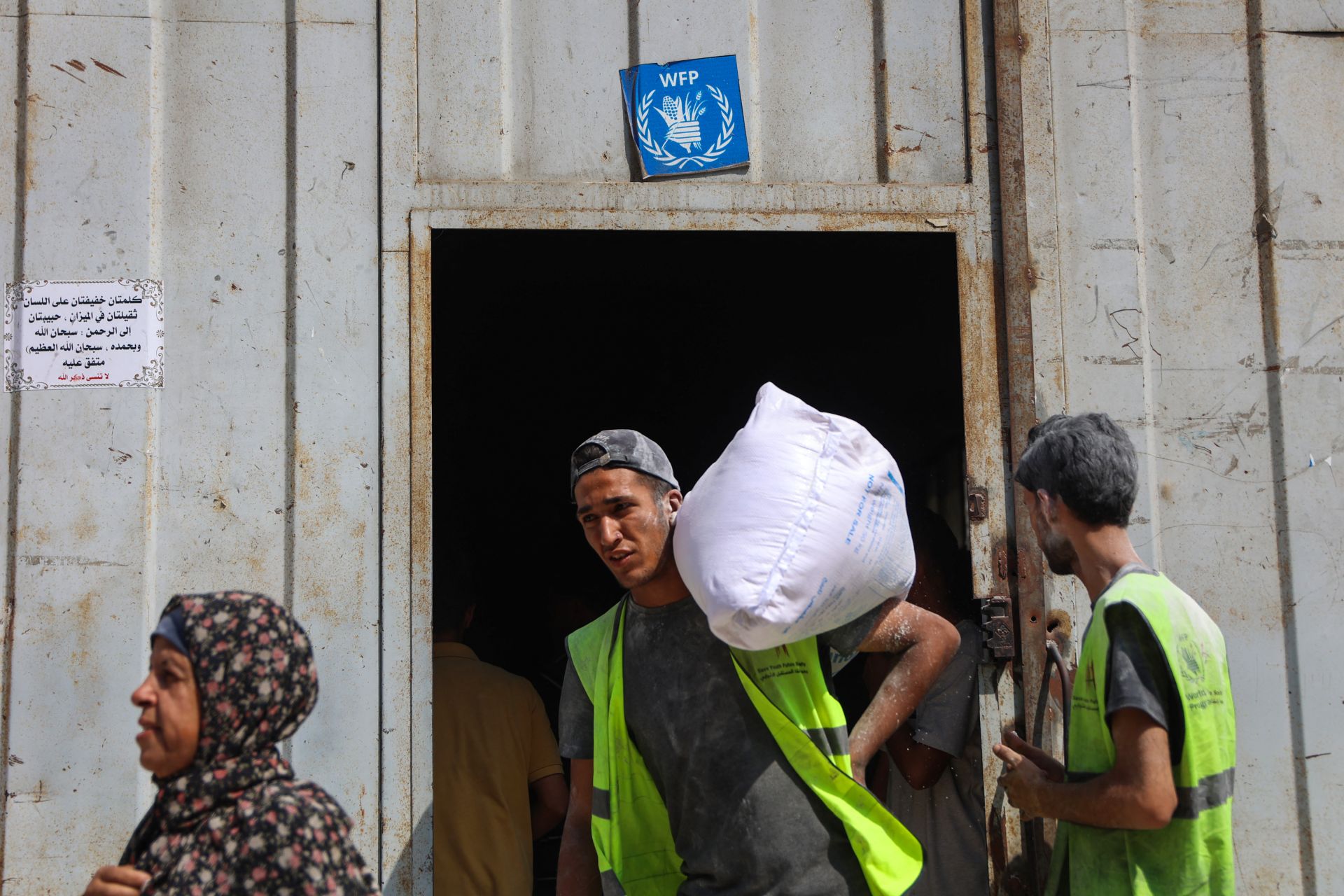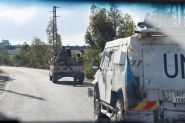- Home
- Middle East
- UN to Use 'Humanitarian Pauses' to Try to Reach Gaza's Starving

A Palestinian man carries a bag of flour at a UN World Food Programme (WFP) warehouse on Al-Jalaa street in Gaza City, in the northern Gaza Strip on July 12, 2025. ©Omar Al-Qattaa/ AFP
The United Nations said it would try to reach as many starving people as possible in Gaza after Israel announced it would establish secure land routes for humanitarian convoys.
The UN's World Food Program (WFP) said it had enough food in, or on its way to, the region to feed the 2.1 million people in the Gaza Strip for almost three months.
UN emergency relief coordinator Tom Fletcher said on X he welcomed the announcement of "humanitarian pauses."
"In contact with our teams on the ground, who will do all we can to reach as many starving people as we can in this window," he said.
WFP said the pauses and corridors should allow emergency food to be safely delivered.
"Food aid is the only real way for most people inside Gaza to eat," it said in a statement.
It said a third of the population had not been eating for days, and 470,000 people in Gaza "are enduring famine-like conditions" that were leading to deaths.
WFP said more than 62,000 tonnes of food assistance were needed monthly to cover the entire Gaza population of two million.
The agency noted that, on top of Sunday's "pause" announcement, Israel had pledged to allow more trucks to enter Gaza with quicker clearances along with "assurances of no armed forces or shootings near convoys."
"Together, we hope these measures will allow for a surge in urgently needed food assistance to reach hungry people without further delays," it said.
'Dystopian Landscape'
UN rights chief Volker Turk said Israel, as the occupying power in Gaza, was obliged to ensure sufficient food was provided to the population.
"Children are starving and dying in front of our eyes. Gaza is a dystopian landscape of deadly attacks and total destruction," he said in a statement.
He criticized a US- and Israel-backed outfit, called the Gaza Humanitarian Foundation (GHF), that in late May began distributing foodstuffs when UN-organized efforts were blocked.
Turk said the GHF's "chaotic, militarized distribution sites were "failing utterly to deliver humanitarian aid at the scope and scale needed".
His office says Israeli forces have killed more than 1,000 Palestinians trying to get food aid in Gaza since the GHF started operations, nearly three-quarters of them in the vicinity of GHF sites.
'Starvation Crisis'
"The starvation of people in Gaza must end now," UN refugee chief Filippo Grandi said on X.
"Standing with UN and NGO colleagues ready to deliver desperately needed, lifesaving aid to hundreds of thousands at risk of death."
Fletcher's UN Office for the Coordination of Humanitarian Affairs (OCHA) warned Friday that conditions on the ground in Gaza were "already catastrophic" and deteriorating.
"The starvation crisis is deepening," it said.
OCHA said UN teams were in place to ramp up deliveries into the Palestinian territory as soon as they were permitted to do so.
"If Israel opens the crossings, lets fuel and equipment in, and allows humanitarian staff to operate safely, the UN will accelerate the delivery of food aid, health services, clean water and waste management, nutrition supplies, and shelter materials," it said.
“Alarming levels”
According to the World Health Organization, malnutrition rates are reaching "alarming levels" in the Gaza Strip. The WHO warned on Sunday, of its consequences, saying the "deliberate blocking" of aid was entirely preventable and had cost many lives.
"Malnutrition is on a dangerous trajectory in the Gaza Strip, marked by a spike in deaths in July," the WHO said in a statement.
Of the 74 recorded malnutrition-related deaths in 2025, 63 had occurred in July -- including 24 children under five, one child aged over five, and 38 adults, it added.
"Most of these people were declared dead on arrival at health facilities or died shortly after, their bodies showing clear signs of severe wasting," the UN health agency said.
"The crisis remains entirely preventable. Deliberate blocking and delay of large-scale food, health, and humanitarian aid has cost many lives."
Nearly one in five children under five in Gaza City is now acutely malnourished, the WHO said, citing its Nutrition Cluster partners.
It said the percentage of children aged six to 59 months suffering from acute malnutrition had tripled in the city since June, making it the worst-hit area in the Palestinian territory.
In Khan Yunis and middle Gaza, those rates have doubled in less than a month, it added.
"These figures are likely an underestimation due to the severe access and security constraints preventing many families from reaching health facilities," the WHO said.
Israel on Sunday began a limited "tactical pause" in military operations to allow the UN and aid agencies to tackle a deepening hunger crisis.
But the WHO called for sustained efforts to "flood" the Gaza Strip with diverse, nutritious food, and for the expedited delivery of therapeutic supplies for children and vulnerable groups, plus essential medicines and supplies.
"This flow must remain consistent and unhindered to support recovery and prevent further deterioration", the Geneva-based agency said.
AFP
Read more



Comments